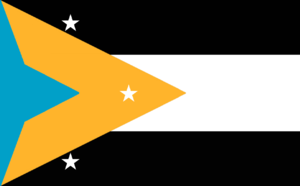Forseti
|
Republic of Forseti
Republikken Forseti
|
|||||
|---|---|---|---|---|---|
| [[File:]] | |||||
| The flag of the Forestian Republic. | |||||
| Motto | Enten Fred eller Krig | ||||
| Common Name | Forseti | ||||
| Anthem | Havets stjerne | ||||
| Denonym | Forsetian | ||||
| Official languages | Delrassi, Salredi, Erusi, Gallante | ||||
| Politics | |||||
| Capital | Forset | ||||
| Government | Federal presidential constitutional republic | ||||
| Foundation | 2140 | ||||
| Prime Minister | Alexander Eriksen | ||||
| Demography | |||||
| Ethnicities | Delrassi, Blythe, Salredi, Erusi, Gallante | ||||
| Population | 5,391,369 | ||||
Forseti, officially The Republic of Forseti, known by the people as "The Fatherland", is a prosperous nation located in the Lower Forseti Region. Bordered by Alectonova to the north, Orion Castana to the west and South Forseti to the south Forseti is an ethnically diverse nation filled with natural resources. The nation is known for its expansive coastline, with its large and strategically important ports having easy access to the Soltem Sea, the Greater Bay of Baskay and the Bulge Bay. The nation has a mild climate, yet its winters are often sub-zero.
Etymology
The name Forseti comes from the Old Southern word Fosite meaning "The Presiding One" which is believed to be referring to a pre-medieval monarch who controlled great amounts of land in what is presently known as Lower and Upper Forseti. Despite this King being found in legends, and with currently no historical backing for his existence, the name was used by a wealthy lord who founded a city on the Soltem Sea named Forset, a contraction of the original name, which grew prosperous and wealthy on the back of its impressive fishing industry. As the city grew more powerful surrounding lands started to submit and the name was given to the region.
Government
Parliment
The Forsetian Government consists of a bicameral legislature and is made up of two Houses: the lower house is called the House of Representatives and the upper house is named the Senate. The lower house currently has 165 members, each elected from single-member constituencies, known as electoral divisions (commonly referred to as "electorates" or "seats") using full-preference instant-runoff voting. This tends to lead to the house being dominated by two major parties, the Nationalist Party and the Social Party. The government must achieve the confidence of this House to gain and hold power. The leader of the House of Representatives is known as the Chancellor.
The upper house, the Senate, is elected by provincial governments, who are themselves also voted in by the people, under the single transferable vote system of proportional representation. There are a total of 60 senators: 10 senators are elected from the region of Forset and each outlying region elects 5 senators. This makes the total number 60, i.e. 10x5 + 1x10.
The Senate is vested with significant power, including the capacity to block legislation initiated by the government in the House of Representatives. As a result of proportional representation, the chamber features a multitude of parties vying for power. The governing party or coalition, which must maintain the confidence of the lower house, rarely has a majority in the Senate and usually needs to negotiate with other parties and Independents to get legislation passed. The leader of the Senate holds the most powerful position in the country, they are known as the Prime Minister
The Prime Minister appoints a Second Minister who must have a position within the Senate. Together they handle all affairs both internal and foreign, given the rare chance of a majority in the senate the Second Minister is usually the head of the next largest party in the senate.
Judiciary System
The judiciary system is overseen by the Chief Justice, a member of the leading party in the House of Representatives and does not need to have a seat. All judicial matters are handled by the High Court, with provincial judges being elected by the regional governments every 10 years.
Military
The Armed forces of Forseti are led by the Forseti High Command with the Prime Minister at its head
